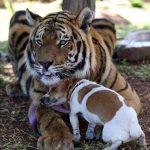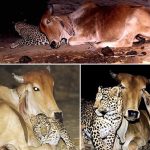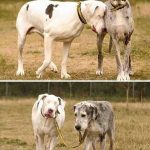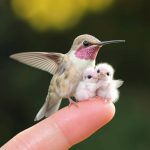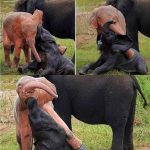When Kangaroos Cry 🦘💔

In a quiet clearing deep within the ancient heart of the Australian bush — where the eucalyptus leaves shimmer in the golden light, and the air hums with the quiet rhythm of cicadas — a mother kangaroo lay still beneath the trees. Her once-powerful legs, the very limbs that had carried her across miles of wild terrain, now refused to move. Her body was failing. Her breaths came in shallow waves. She had been injured days before — no one knew exactly how — and now, there was nothing left but time, slipping slowly through the cracks of her final moments. Yet even as her strength faded, her eyes remained alert, searching not for safety or food, but for her joey. Somewhere out there, her little one still wandered the bush, and her heart would not rest until she saw him again.
 And then, through the hush of the forest, the young joey appeared. Small, unsteady, and still growing into his legs, he emerged from behind a patch of brush, his nose twitching, his ears perked. Something in the air felt different — heavy, still, wrong. He hopped cautiously forward, his eyes locking with hers. She did not rise to greet him as she always had. She didn’t nuzzle his head or push him toward shelter. She simply looked at him, and in that gaze, he understood. With childlike hesitation, he stepped closer and slowly raised his tiny paw. The mother, using the last thread of her strength, lifted hers to meet his. Their hands touched — a delicate, trembling connection that carried everything neither could say: love, protection, comfort, and a silent goodbye.
And then, through the hush of the forest, the young joey appeared. Small, unsteady, and still growing into his legs, he emerged from behind a patch of brush, his nose twitching, his ears perked. Something in the air felt different — heavy, still, wrong. He hopped cautiously forward, his eyes locking with hers. She did not rise to greet him as she always had. She didn’t nuzzle his head or push him toward shelter. She simply looked at him, and in that gaze, he understood. With childlike hesitation, he stepped closer and slowly raised his tiny paw. The mother, using the last thread of her strength, lifted hers to meet his. Their hands touched — a delicate, trembling connection that carried everything neither could say: love, protection, comfort, and a silent goodbye.
Moments later, the father arrived. He had been nearby, keeping watch, always the silent sentinel. Larger and stronger than both, he moved with care and reverence. He st

epped beside her, lowered himself gently to the ground, and with powerful but tender arms, cradled her head against his chest. He didn’t run. He didn’t look away. He stayed. The joey nestled beside them, too young to understand the full weight of death, but old enough to feel the ache of something ending. And so they stayed there — the three of them — wrapped in silence and sunlight, in a bond no words could define.
This was not instinct. This was not nature as we coldly describe it. This was family. It was grief. It was love — raw, unguarded, and heartbreakingly human. They didn’t need language. Their silence said more than we ever could. In that moment, under the vast Australian sky, there was no difference between them and us. They were not creatures. They were a mother, a father, and a child — holding on, letting go, and grieving together.
Yet far beyond the bush, bulldozers roar. Trees fall like matchsticks. Fires rage. Land is cleared for roads, for houses, for profit. Entire habitats vanish in days. And those who remain — those who mourn, those who feel — are pushed to the edge of survival. If only we could witness this moment, truly see it, not through the lens of wildlife documentaries or scientific detachment, but through the eyes of empathy. If we saw these kangaroos not as species, not as “pests” or “populations,” but as families with hearts that love and break — would we still destroy their homes so easily?
Because when kangaroos cry, they do not wail or scream. They don’t shed tears like we do. But they feel. In their touch, in their stillness, in their refusal to leave one another behind — there is grief as deep and ancient as any human sorrow. And perhaps the only real difference is that they suffer in silence, unseen by those too busy to notice.
So let us not turn away. Let us not dismiss their pain or reduce their lives to data points. Let us remember that every forest we burn, every patch of land we flatten, has been someone’s home — not just for animals, but for families like this. The mother who waited. The joey who reached out. The father who stayed.
All families — human or wild — deserve the right to live safely, to love freely, and to say goodbye with peace and dignity. And maybe, if we listened more closely, we would realize: when kangaroos cry, they are not asking for pity. They are reminding us that we are not alone in our capacity to love, to grieve, and to hold one another until the very end. 🌿🕊️💔
